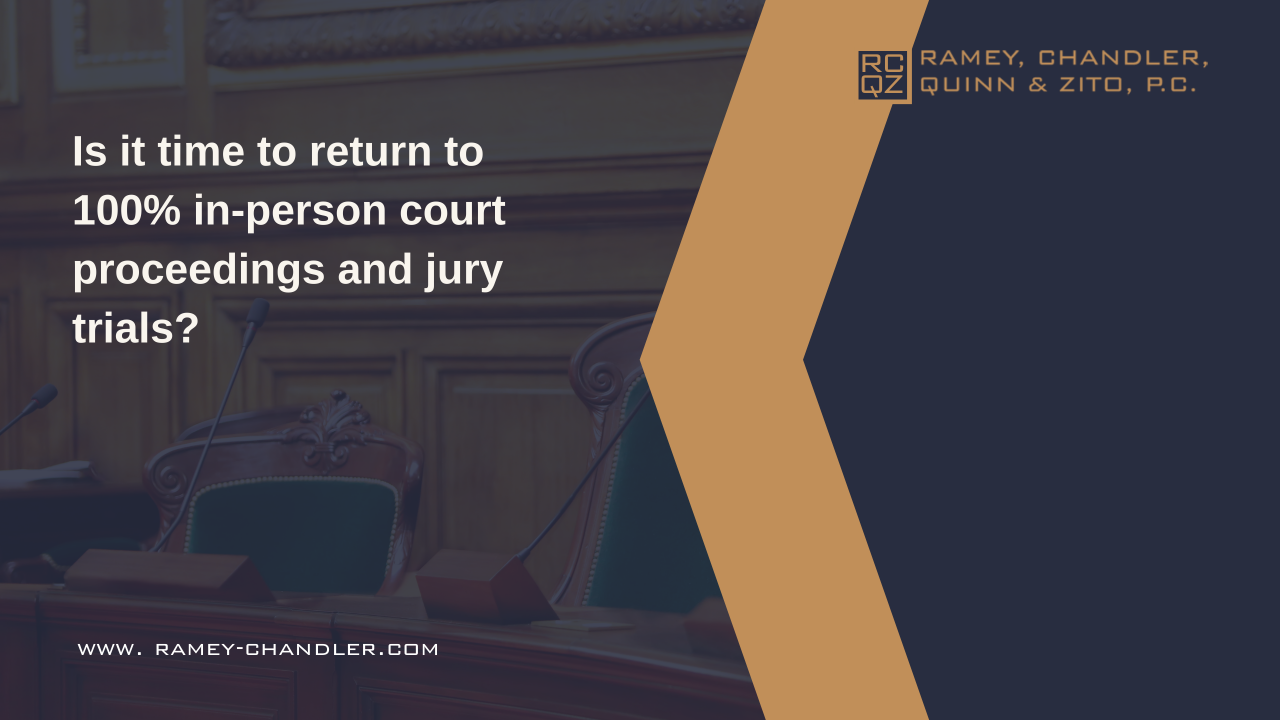Is It Time to Return to 100% In-Person Court Proceedings and Jury Trials?
Wade Quinn, Esq.
Over the past 18+ months, we have all become familiar with remote court proceedings. Hearings have been almost exclusively conducted via Zoom. Non-jury cases have moved forward remotely or, more recently, in person. However, jury trials have been few and far between. Zoom jury trials have been fraught with problems on all sides. In-person jury trials have occurred with protections for jurors, court personnel and lawyers. However, the protections, while necessary, have made the trials cumbersome and inefficient. I have fully prepared for more than 10 jury trials in these past months, only to have the trial pushed off the docket due to COVID concerns. With the Delta variant currently in decline, many are asking whether it’s time for a return to a more normal environment; to wit, court proceedings and jury trials more like they used to be. Why might now be the time to do so?
• Remote proceedings generally suck.
This doesn’t just apply to jury trials. Many judges have complained that lawyers who appear remotely for court proceedings are less effective advocates for their client. While appearing remotely, lawyers tend to multi-task to ensure they get as much work done as possible. When their case is called, some lawyers have struggled to be fully present to the case at hand. Some have even appeared remotely while driving to or from their next deposition or meeting. Many judges have expressed their displeasure with screen-sharing. Some lawyers want to use this function in even the simplest of cases when PowerPoints and other visual presentations were previously used in only complex cases. While in the past judges have relied upon paper copies of certain documents which allowed them to look at the motion and key exhibits at the same time, screen sharing has limited judges’ ability to consider all the necessary materials during a court proceeding. Lawyers who appear remotely very seldom confer with their opponent to try to reach agreement prior to appearing on Zoom. While in the past judges would send lawyers out of the courtroom to confer, sending lawyers to a virtual “meeting room” seldom pays off.
• Remote proceedings are less efficient for judges.
There is no doubt that Zoom proceedings have allowed courts and lawyers to keep working throughout the pandemic. In addition, the ability to appear remotely improved lawyer efficiency in many ways. However, many judges have complained that remote proceedings have made their work less efficient. Motion dockets that could be completed in a morning pre-COVID are now taking a full day. Time estimates for remote proceedings that are inaccurate can cause judges to twiddle their thumbs for extended periods of time while they wait for the next hearing to start.
• Potential jurors are showing up.
Early on during the pandemic, getting potential jurors to appear for jury duty was hit or miss. Not so any longer. Counties are taking steps to make jury service better. Some are paying for parking, providing lunch, and increasing jury compensation for longer cases. • COVID-fatigue. Many are just sick of dealing with masks, vaccines, social-distancing and Zoom proceedings. The longing for real human contact is significant and is a legitimate reason to consider a return to live court proceedings and jury trials.
By accepting you will be accessing a service provided by a third-party external to https://ramey-chandler.com/

